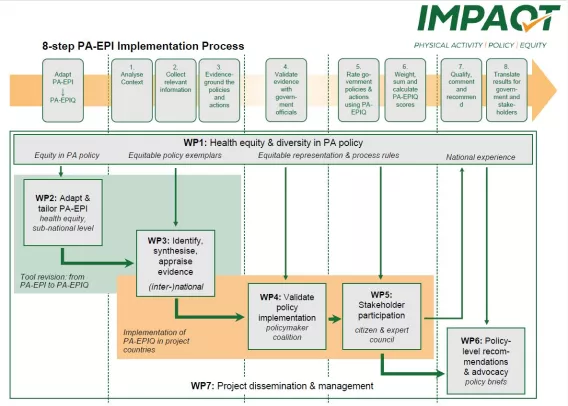
HEALTHEQUITY-058 IMPAQT
The growing burden of non-communicable diseases (NCDs) creates a need for effective public policy to change systems instead of individuals and create supportive contexts that reduce NCDs and health inequity. A major determinant of disease reduction is physical activity (PA).
IMPAQT will yield country-specific policy index scores, which will be translated into report cards containing critical implementation gaps and policy recommendations. Transnational comparisons will provide international benchmarks for healthy and equitable PA policy environments. Project lead, Professor Woods, said:
Despite good progress at a country level regarding the introduction of national policies for physical activity, minimal progress has been made on addressing population levels of physical inactivity. This is in part due to a lack of ‘upstream’ policy progress in domains known to be effective for physical activity promotion such as health, schools, transport, urban design, sport, communities, workplaces and communication.
The IMPAQT project, using the PA-EPI tool, will help policymakers determine:
1) Where their country is now in relation to the implementation of Physical Activity policies, known to be effective in addressing population inactivity.
2) What is possible to change, IMPAQT will provide pathways on how to reach goals to address critical implementation gaps and a mechanism for countries to document progress”.

The overall aim of IMPAQT is to improve health equity in and through physical activity (PA) for large parts of the population by further developing, testing and promoting policy benchmarking as a valuable tool to make PA policy more effective and equitable.
To achieve this aim, IMPAQT consists of seven work packages (WPs). To learn about the specific objectives of each WP, check out details under the 'work package' tab on the website.
In brief, IMPAQT will update an existing policy benchmarking tool (the PA-EPI) using the latest scientific evidence to incorporate a health equity focus into all relevant components, as well as its implementation process. In addition, the PA-EPI tool will be adapted for use at both the national and subnational level for increased reach and versatility.
IMPAQT will then test the PA-EPI in six countries using an equitable, participatory process. It will evaluate this process and its outputs and derive policy-level recommendations. Project partners will engage the European Parliament, the EU PA Focal Point Network, and WHO to advocate for PA and health equity and to promote further utilisation of the PA-EPI.
This overarching mission can be broken down into seven specific objectives:
For more information on the PA-EPI tool check out our short video under the 'PA-EPI overview' tab on the website.
The Scientific Advisory Board of IMPAQT have been selected due to their knowledge and expertise in policy and equity research. We value their contribution, and believe that it will help to ensure IMPAQT meet and indeed exceed its deliverables. The specific purpose of the IMPAQT Scientific Advisory Board is:
- To review the programme of work identified within the IMPAQT programme and, where relevant, suggest advice on its improvement.
- To review and monitor progress of IMPAQT programme of work;
- To identify, and clarify with the IMPAQT team, obstacles to the achievement of the deliverables within a timely manner;
- To contribute to the removal of such obstacles, where possible, by means such as knowledge-sharing;
- To review synopsis reports to the IMPAQT Steering Group, recommendations for action and overall evaluation of the programme of work.
- Responsibilities of the members to keep all informed of any new and relevant initiatives for IMPAQT.
